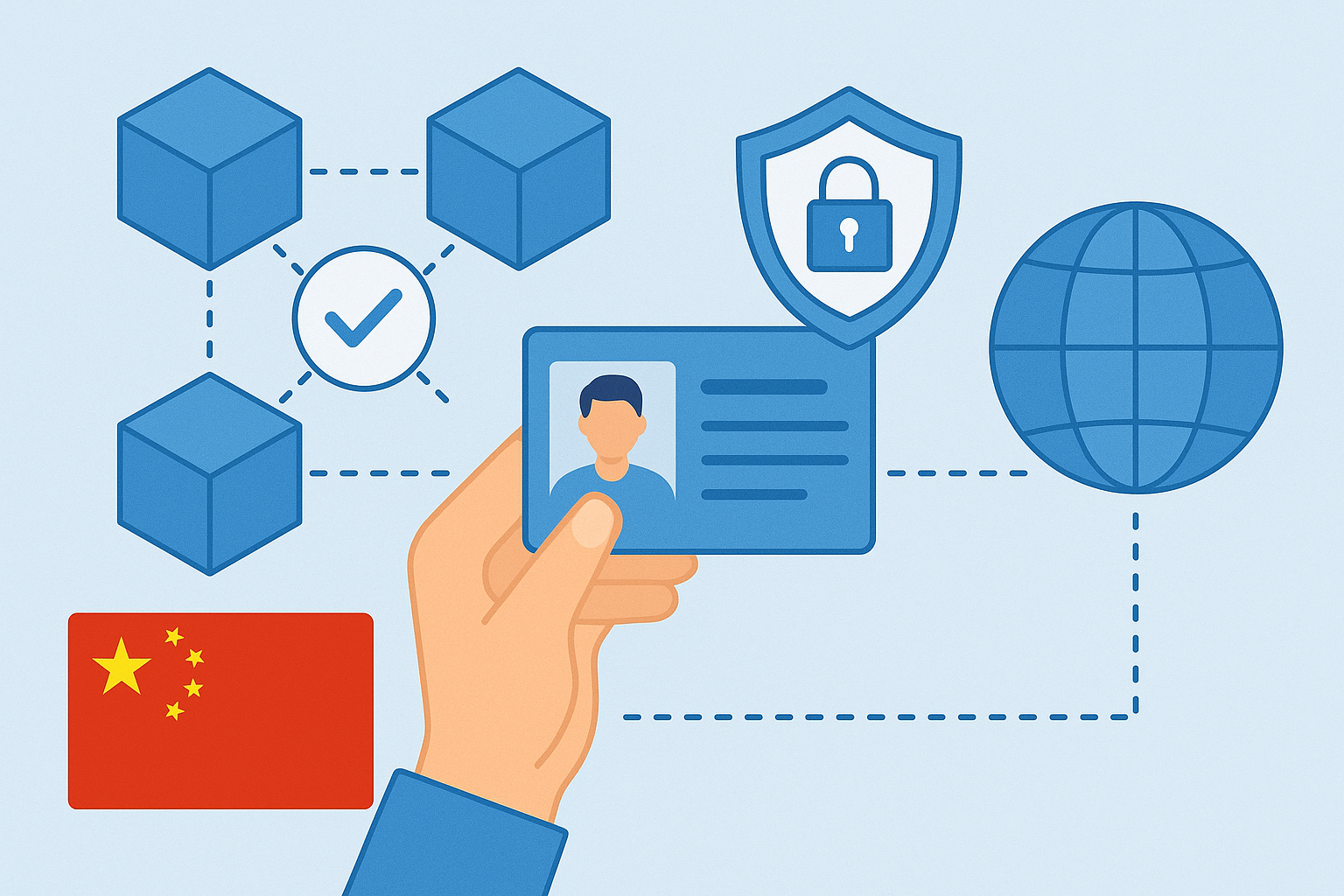Blockchain Technology
China RealDID Expands Blockchain-Based Real-Name Identity Verification For Cross-Border Use

Introduction
China’s Real-Name Decentralized Identifier System, known as RealDID, represents a pioneering government-issued blockchain identity initiative. First rolled out in December 2023, RealDID leverages public-key cryptography and anonymized DID addresses to enable real-name verified digital identity while preserving user privacy. As of mid-2025, Beijing has expanded RealDID into Hong Kong, launching cross-border zero-PII KYC capabilities for mainland citizens accessing regulated digital services. This article examines RealDID’s origins, underlying technology, privacy architecture, pilot programs, deployment strategy, use cases in fintech and travel, regulatory context, and the broader implications for national and global identity systems.
Origins And Purpose
RealDID was developed by China’s Ministry of Public Security via the First Research Institute, in conjunction with Red Date Technology and the Blockchain-based Service Network (BSN) China. Officially launched in December 2023, the system aims to serve China’s entire population of approximately 1.4 billion by combining real-name compliance with blockchain-based privacy-preserving credentials. Designed as the world’s first national-level decentralized identifier system, RealDID integrates with China’s existing Cyber Trusted Identity (CTID) infrastructure to verify identities while furnishing users with DID addresses and key pairs for online authentication.
Initial roll-out targets were modest: issuing an estimated 5 million RealDID identities in the first year via pilot projects including government bodies, banks, and large enterprises. Adoption is intended to scale gradually until coverage reaches the majority of Chinese citizens.
Technology And Architecture
RealDID is built atop the BSN China infrastructure, a state-supported blockchain service network integrating permissioned and public blockchain frameworks along with domestic cloud infrastructure providers. Through BSN China’s Yan’an Chain, RealDID stores public DID entries in a transparent yet permissioned ledger.
The identity verification process is overseen by Anicert via the CTID system. CTID enforces a three-factor verification including government ID, legal name, and facial recognition before issuing a RealDID credential. Once verified, each user can generate multiple public-private key pairs; the public key is embedded in a DID document on chain, while the private key remains under user control, enabling anonymous authentication with government-accessible mapping to the verified identity.
By design, service providers—including banks, apps, and platforms—do not have access to personal PII. Instead, they validate the DID signature without learning user identity; identity linkage is retained by government authorities only, satisfying both Chinese real-name laws and privacy aims. The system even supports file-signing with encrypted watermarks proving provenance while preserving anonymity in day-to-day use.
Pilot Expansion Into Hong Kong
In November 2024, RealDID underwent trials in Hong Kong, marking its first cross-border deployment and the world’s first zero-PII cross-border KYC trial supported by RealDID. Organized by Red Date Technology in partnership with China Mobile, OpenWallet Foundation, Flare, and IDA, the DID-Based Cross-Border Identity Summit showcased four pilot tracks:
- Entry inspection at Hong Kong border using RealDID instead of physical permit.
- Anonymous registration on regulated stablecoin wallet app without exposing identity.
- Purchase of tokenized financial products with built-in tax and regulatory compliance.
- Anonymous Travel Rule compliance between financial institutions, enabling regulated remittance without revealing PII.
This pilot enables mainland Chinese citizens to travel to Hong Kong, access regulated digital financial services, and onboard stablecoin wallets without presenting identity documents or revealing phone numbers—yet remain compliant under KYC laws.
Privacy-Preserving Design: Front-End Anonymity, Back-End Compliance
At the core of RealDID is its privacy-preserving architecture: users authenticate anonymously to platforms using DID addresses and cryptographic signatures, while government verification agencies retain the ability to resolve a DID to a real identity when legally required. No third party—including service providers or blockchain vendors—can trace who is using a given DID, what services they access, or when they use them.
This balance solves a fundamental challenge: complying with China’s real-name online account rules while minimizing centralized PII exposure. It also negates the need for platforms to store identity documents or manage KYC processes, reducing data risk and liability for businesses.
Use Cases & Functional Scope
Real-Name Login and Platform Onboarding
Users can sign up or sign in to online services via RealDID, using their DID address rather than name or ID number—a process that eliminates manual identity documentation while meeting compliance requirements.
Cross-Border Travel & Border Control
In Hong Kong, RealDID served as a digital alternative to physical travel permits in entry inspections. Mainland citizens used RealDID to verify identity at immigration lanes, maintaining anonymity while facilitating automated KYC in regulated contexts.
Regulated Stablecoin Transactions
Users registered anonymously on stablecoin wallet apps through RealDID. They can buy and hold regulated digital assets under Hong Kong’s stablecoin framework without submitting personal ID documents.
Purchase of Tokenized Financial Products
By using RealDID-based KYC, users can acquire tokenized securities or investment products while maintaining anonymity, with compliance and tax-checks embedded via blockchain verification.
Travel Rule & Financial Institution Compliance
RealDID enables anonymous remittance between financial institutions, adhering to global finance identity standards while preserving user-controlled privacy—a notable application in cross-border finance and institutional protocols.
Operational Roll-Out Roadmap
RealDID’s deployment is staged in phases:
Phase 1 (Dec 2023–2024): Pilot issuance of 5 million RealDID identities via selected institutional partners such as Minsheng Bank, Pacific Insurance, China Mobile, and the National Health Commission.
Phase 2 (Nov 2024–mid 2025): Hong Kong pilot for cross-border use, expanding user control and testing financial and travel use cases.
Phase 3 (2025 onward): Scaling issuance to reach broader citizen population, integrating RealDID into national service platforms, fintech ecosystems, smart cities, and possibly other jurisdictions under the Belt and Road Initiative via BSN international infrastructure.
As of early 2025, RealDID is still largely inaccessible to IP addresses outside mainland China, though cross-border service is facilitated via specialized interfaces in Hong Kong and potentially other pilot jurisdictions.
Regulatory & Legal Context
China’s real-name registration laws require online services to be linked to verified identities, typically via phone number or government ID. RealDID satisfies these regulations by linking to CTID-verified identities while preventing platforms from collecting PII directly.
BSN and RealDID operate entirely within Chinese legal jurisdiction, aligning with national strategy to maintain control over digital systems. Meanwhile, international observers express caution over government access and surveillance possibilities, since encrypted keys and DID-to-identity mapping remain tied to state authorities.
At the same time, RealDID’s design echoes self-sovereign identity principles and decentralized identity standards, albeit under government authority. It defines a potential model for regulated DID deployments where compliance and privacy are balanced.
Privacy, Trust, And Surveillance: Balanced Or Risky?
RealDID claims to maximize privacy by allowing users to authenticate via masked credentials while keeping identity separate from service providers. But the government retains ultimate mapping authority—which raises questions over surveillance potential. Critics argue that though private keys remain with users, the state-controlled CTID database may surveil or de-anonymize users when legal or security triggers arise.
Supporters maintain that RealDID’s architecture reduces data centralization risk from commercial platforms and limits PII exposure—making identity verification more secure overall. Whether RealDID achieves its privacy goals depends largely on legal safeguards, auditability of CTID, and trust in government use of the identity linkage.
Broader Implications & Comparison With Global Trends
RealDID is the world’s first government-led national DID system. It signals China’s push to lead identity infrastructure at scale, with explicit functional use across travel, finance, and regulated online services. Its cross-border pilot in Hong Kong further tests real interoperability while preserving anonymity.
Globally, identity initiatives such as the EU’s eIDAS 2.0 and others in UAE, Singapore, and digital wallet standards are exploring governmental DID frameworks. RealDID may shape the global model for how governments can issue DID credentials while respecting privacy and enabling cross-jurisdiction compliance.
RealDID’s commercial applications in stablecoins, tokenized finance, and travel have immediate relevance to Web3, fintech integration, and scalable identity verification. If RealDID proves secure, scalable, and interoperable, it could become a template for national identity systems in other countries.
Conclusion
China’s RealDID expansion—including its cross-border pilot in Hong Kong—marks a bold, infrastructure-scale effort to deliver real-name identity compliance via blockchain-based DID, merging state oversight with user privacy. From a national perspective, it aligns with China’s ambition to modernize digital governance and establish sovereign control over identity systems. From a global lens, it offers the first real-world template for government-issued decentralized identity systems that could shape future international digital identity standards.











